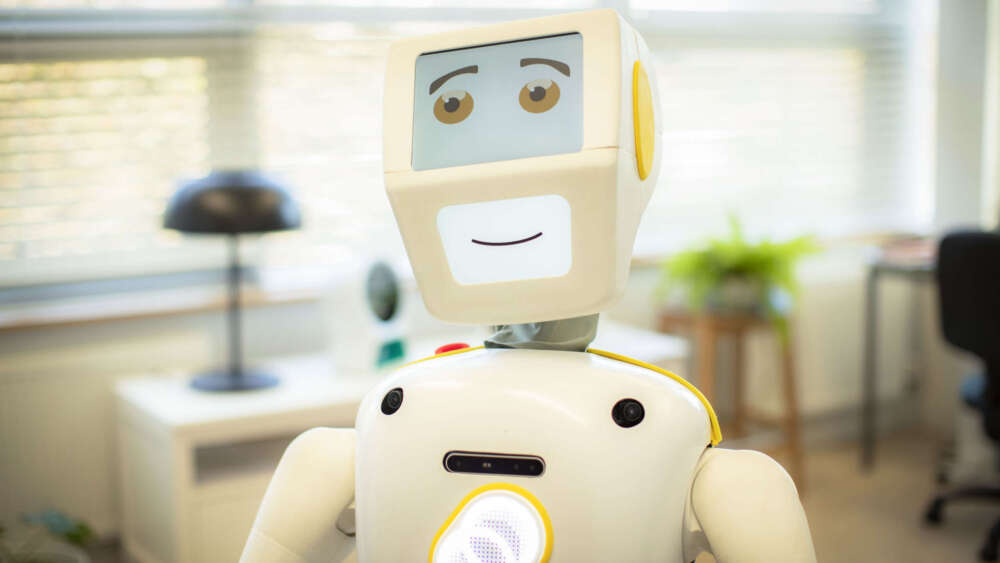An artificial intelligence creation from Trinity College Dublin, Stevie the Robot is coming to Australia next year to see how he fares as a support in the care of people living with dementia.
“Stevie the Robot can perform routine tasks such as reminding a resident it’s time for their medication, make video calls to loved ones or remotely dim light switches,” said Marie Alford, HammondCare Dementia Centre’s Head of Business Development.
“Stevie would also be able to help with music therapy and physical exercise routines.”
HammondCare is an independent Christian charity and provider of health and aged carer services, with a focus on dementia care and palliative care. Recently, the HammondCare International Dementia Conference 2020 featured a video-linked appearance by Stevie, who stands about 1.4 metres tall and weighs 60 kilograms.
“We see the technology in partnership with care staff, not in competition.” – Associate Professor Connor McGinn
Ahead of next year’s Australian trial of Stevie’s assistance to HammondCare’s residents, Associate Professor Connor McGinn – who leads the Trinity College research team – told the conference that such robots could “take the pressure off staff”, rather than replace them.
He envisioned that a robot like Stevie could free staff members to focus more upon one-on-one care. Alford affirmed this: “A robot cannot replace the role of care workers or nurses or be a substitute for loved ones or other human relationships – we see the technology in partnership with care staff, not in competition.”
Trinity College’s placement of robots in elder care settings has been gaining attention during the past few years (including being named by Time as one of the 100 best inventions of 2019). The healthcare system already features plenty of examples of AI at all levels, and next year’s HammondCare trial aims to show benefits specific to people living with dementia.
“There is also potential for Stevie to play a role to support reminiscence through pictures, video and stories,” said Alford, pinpointing the critical area of memory. McGinn explained more: “A robot is able to instantly play any kind of song you might want to play.”
“If you, say, tell him I grew up in a small town in WA, the robot – through its computer – has the ability to find images or videos of that town instantly.”
Overseas trials with Stevie have seen him act as a storyteller, and a host of wellness exercises, musical bingo games, and quizzes like Who Wants To Be A Millionaire. While Stevie will not be trialled to play a key role in future responses to pandemics or similar outbreaks, his immunity to any infection could see him called into complete tasks considered risky to staff and residents.
But there are also other potent contributions which robots could make, according to McGinn.
“If you have a look at the problems that are endemic in the long-term care industry around depression, loneliness, feeling of social isolation – being able to overcome these has huge benefits,’’ he said.
“The benefits include better medication adherence, better sleeping patterns, more social interaction, more cognitive engagement and slowing down the damaging effects of dementia.”
“It is important to explore opportunities, while being wise about challenges.” – Andrew Nixon
As Eternity covered this year with professor John Lennox, the rise of AI presents an ethical minefield around what it means to be human, how AI machines make decisions, and the parameters around their use. Reverend Andrew Nixon is HammondCare’s Head of Pastoral Care and Volunteers Services and he told Eternity that, as a Christian organisation, HammondCare “should be at the forefront of best-practice care for people with dementia”.
“In this case, there is much we are yet to learn about the place of AI and applications such as Stevie the Robot – but we can see in society that AI is here to stay. So, it is important to explore opportunities, while being wise about challenges.
“We already have apps that read the bible for us and apps that sing our worship songs for us. So, in itself, using technology isn’t necessarily a problem.
“If the robot is used as an alternative to human interaction, that is a problem.”
Email This Story
Why not send this to a friend?




